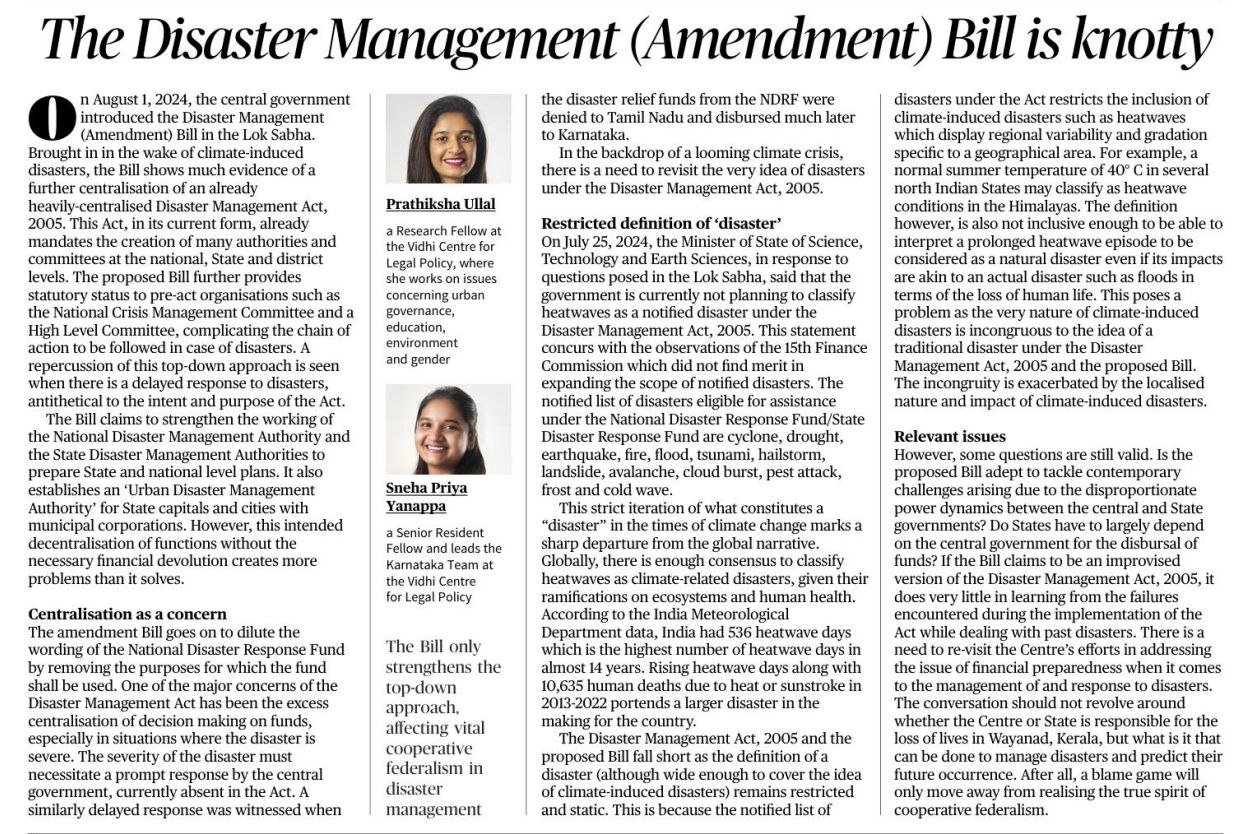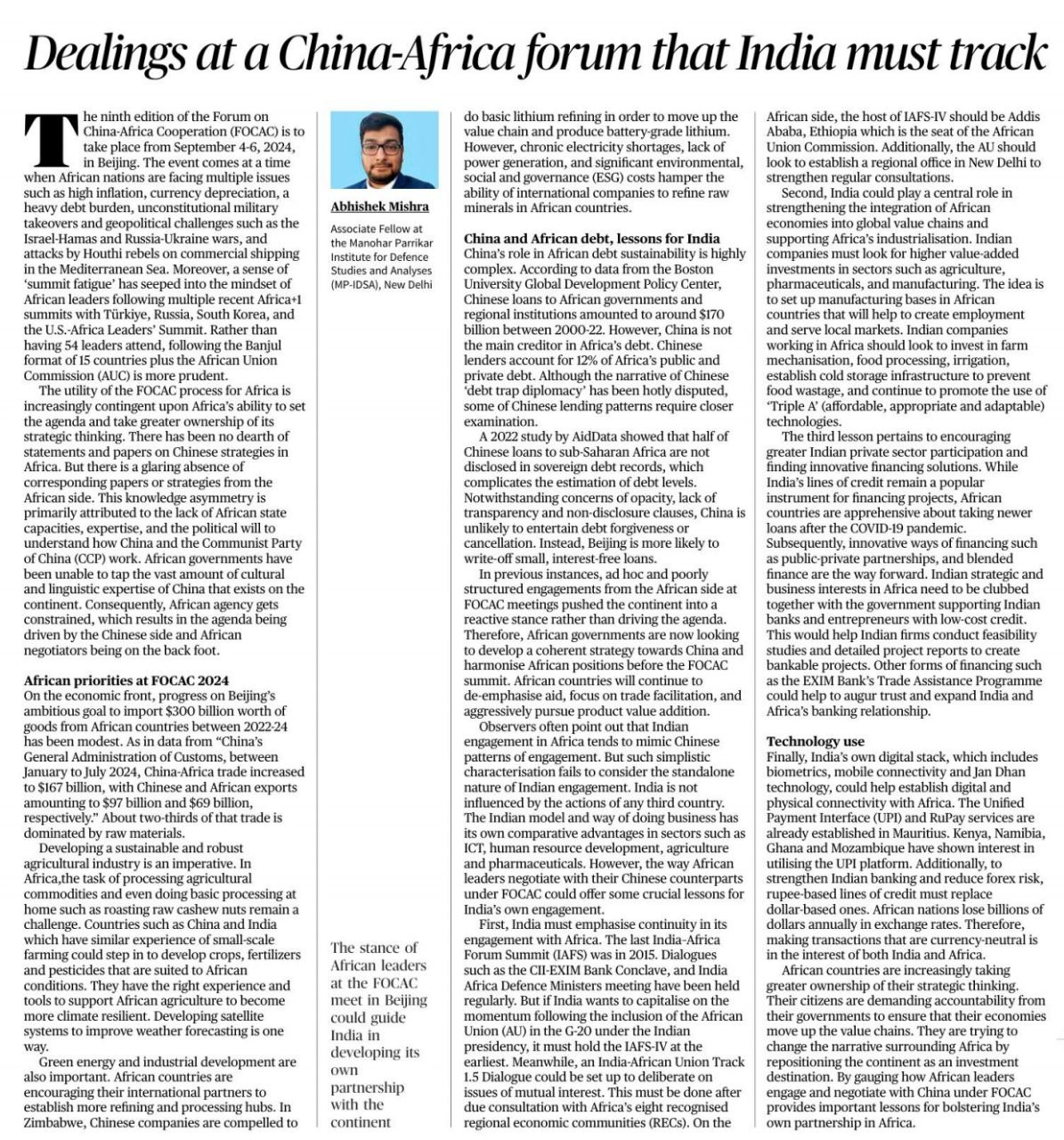1. Disaster Management (Amendment) Bill, 2024
Introduction:
- The Disaster Management (Amendment) Bill, 2024, introduced on August 1, 2024, aims to amend the existing Disaster Management Act, 2005.
- The Bill is seen as a response to increasing climate-induced disasters and seeks to centralize the disaster management framework further.
- It has sparked significant debate over its implications for federalism and its ability to address contemporary disaster management challenges.
Key Features of the Amendment:
- Centralization of Authority:
- The Bill strengthens the authority of the National Disaster Management Authority (NDMA) and State Disaster Management Authorities, mandating more centralized control.
- Statutory status is given to pre-existing committees like the National Crisis Management Committee and the High-Level Committee, potentially complicating the disaster response chain of command.
- Urban Disaster Management:
- Introduction of an “Urban Disaster Management Authority” for state capitals and cities with municipal corporations, aiming to address the unique challenges posed by urban disasters.
- Dilution of the National Disaster Response Fund (NDRF):
- The amendment alters the language regarding the use of NDRF funds, narrowing the scope for their deployment.
Criticism and Concerns:
- Excessive Centralization:
- The amendment is criticized for increasing centralization, which may lead to delayed responses during disasters, as seen in the past.
- The bill could potentially weaken cooperative federalism by limiting the autonomy of states in disaster management.
- Restricted Definition of ‘Disaster’:
- The bill does not classify heatwaves as a “notified disaster,” which has raised concerns given the rising frequency and intensity of heatwaves in India.
- This exclusion is seen as a departure from the global trend of recognizing climate-induced events as disasters.
- Implications for Financial Decentralization:
- The bill’s changes to the NDRF’s usage could create financial bottlenecks, especially in situations requiring immediate response and relief.
Relevant Issues:
- The bill’s narrow focus on traditional disasters and the exclusion of certain climate-induced events, like heatwaves, from the definition of disasters, highlights the need for a more contemporary understanding of disaster management.
- There is concern that the bill does not adequately address the disproportionate power dynamics between central and state governments in disaster management.
Conclusion:
The Disaster Management (Amendment) Bill, 2024, represents an effort by the government to streamline disaster response mechanisms in the face of emerging climate challenges.
However, its focus on centralization, exclusion of climate-induced events from the definition of disasters, and the potential for delayed responses due to the rigid structure proposed, raise significant concerns.
The bill may require re-evaluation to ensure that it supports cooperative federalism and effectively addresses the evolving nature of disasters.
Mains Practice Question:
|
Q: “Critically analyze the Disaster Management (Amendment) Bill, 2024, in the context of its impact on federalism and its ability to address climate-induced disasters. What changes would you suggest to make the bill more inclusive and effective?”
|
2. China-Africa Forum and India's Strategic Interests
Introduction:
- The Forum on China-Africa Cooperation (FOCAC) is a crucial platform for Sino-African relations, focusing on trade, investment, and development assistance.
- The 9th edition of FOCAC (September 4-6, 2024) in Beijing takes place amid global economic challenges, including high inflation, currency depreciation, and geopolitical tensions.
- India, though not directly involved, has significant interests in monitoring and understanding the dynamics of this forum, especially in the context of its strategic and economic interests in Africa.
Key Issues and Context:
- China’s Expanding Influence:
- China’s ambitious economic goals in Africa include importing $300 billion worth of goods from African countries by 2022-24.
- Significant Chinese investments in African infrastructure, including logistics, transport, and energy sectors.
- China’s dominance in Africa’s raw material markets, including minerals essential for industries like lithium refining.
- Debt Diplomacy:
- China has lent approximately $700 billion to African governments and institutions since 2000.
- Chinese loans constitute about 12% of Africa’s public and private debt, raising concerns about debt sustainability.
- Unlike other global lenders, China avoids debt forgiveness or low-interest loans, focusing on strategic investments.
- Challenges for African Nations:
- African governments often face a knowledge asymmetry in negotiations, leading to a perceived imbalance in Sino-African relations.
- African nations are increasingly looking to harmonize their strategies to avoid reactive stances and to drive their own development agendas.
- India’s Strategic Interests:
- Comparative Advantage: India needs to monitor FOCAC to understand the shifting dynamics in Africa, a region where it also seeks to expand its influence.
- Digital and Healthcare Sectors: India has emerging strengths in digital technologies and healthcare, which can be leveraged to counterbalance Chinese influence in Africa.
- Debt Sustainability: India can offer alternative financial solutions to African nations that are more transparent and sustainable, avoiding the pitfalls of China’s debt diplomacy.
- Recommendations for India:
- Strengthening Partnerships: India should enhance its diplomatic engagement with African nations, focusing on areas like digital cooperation, healthcare, and sustainable development.
- Leveraging Multilateral Platforms: India should work through multilateral organizations like the African Union to promote inclusive and sustainable development in Africa.
- Private Sector Engagement: Encourage Indian private sector participation in African infrastructure and technology projects, offering competitive alternatives to Chinese investments.
Lessons for India:
- The Chinese approach in Africa emphasizes long-term strategic investments, which are often opaque and heavily focused on resource extraction.
- India needs to adopt a more transparent and partnership-driven approach, focusing on areas where it can offer unique value, such as IT, healthcare, and sustainable development projects.
Conclusion:
The FOCAC 2024 serves as a reminder of the strategic importance of Africa in global geopolitics. While China continues to strengthen its ties with African nations, India must actively engage with the continent, offering sustainable, transparent, and mutually beneficial partnerships.
Tracking developments at FOCAC and adapting strategies accordingly is crucial for India to safeguard its interests and expand its influence in Africa.
Mains Practice Question:
|
Q: “Discuss the implications of China’s expanding influence in Africa through the Forum on China-Africa Cooperation (FOCAC). How should India respond to maintain and expand its strategic interests in the region?”
|



